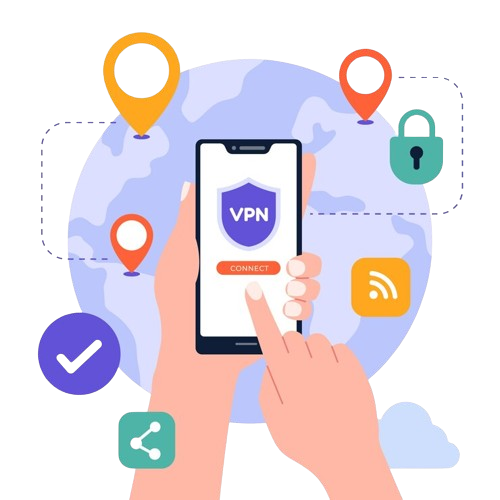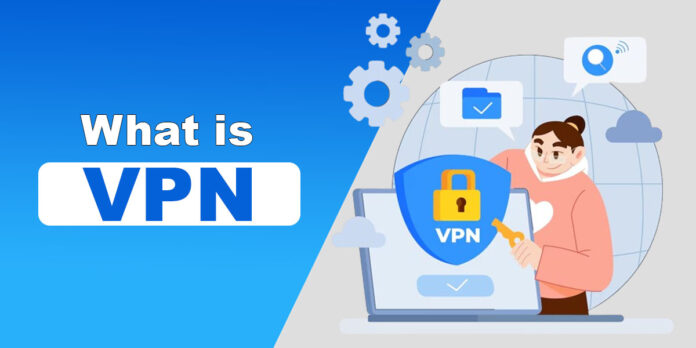The digital landscape is filled with many challenges for both individuals and businesses, which is why the use of VPN is increasing to hide IP addresses, browse anonymously, and protect digital privacy. However, while VPNs offer benefits, they also come with a set of challenges for users.
A VPN ensures that it remains private on internet browsing, but what it is, what its potential uses are, and what the pros and cons are. Knowing all the factors helps you use them accordingly. Learn more about VPNs in this guide.
Let’s Get started!
What is a VPN?
A Virtual Private Network (VPN) is a service that offers private browsing over the Internet and encrypts the connection between the Internet and your mobile. It creates a safe environment for users to hide their IP addresses, browse without leaving a footprint, and receive and send data safely over the Internet.
No one can track or check the user’s online data and activities, but only our Internet provider service knows the traffic. Beyond the advantages, it also comes with challenges like slow internet, some VPNs are not secure, banning issues, subscription plans, and many more.
If you are about to use it on your smartphone, read our article “Do You Need a VPN on Your Phone” to make an informed decision!

Pros and Cons of VPN
VPN comes with both pros and cons. Read here:
| Pros | Cons |
| Hide a user’s IP address | Slower Internet speed |
| Anonymous Browsing | Banned in some regions |
| Access to Block Geolocation sites | Free VPNs are not secure |
| Data Protection | Risk of account hack or block |
| Limit Bandwith Throttling |
Potential Uses of VPN
VPNs have different uses for everyone. Here are some potential uses:
ByPass Censorship
A VPN is used to bypass censorship and access any country. It lets users connect their mobile devices to another country’s region. This means you can connect to any European region while sitting at home in the USA.
Browse Privately
If you don’t want to leave your digital footprint, a reliable VPN makes it possible to browse privately. With this, your browsing history will not be saved, and no one can track your online activity and what you are searching on the internet.
Secure From Public Wifi
Public Wi-Fi is not a secure connection for your device. If you are using public Wi-Fi, then there might be issues like leaking private information, passwords, and data. But a VPN is a solution that protects against a public Wi-Fi connection. If your device is connected with it, then public Wi-Fi owners or hackers cannot steal your private information.
Protect Your Mobile Devices
As mentioned above, public Wi-Fi can access your browsing cookies and history. But there is a way to protect your devices: Some VPNs work as tracker blockers and protect your devices from hackers. However, it also protects your personal data against phishing attacks. Some malicious attacks results in hacking or data loss, but VPN protects against malicious attacks.
Block IP Adress
A VPN allows users to hide the IP addresses of their devices, such as PCs, laptops, or mobile devices. For example, if they are in Mexico but want their IP address private so that no one can find them, they can connect to change their IP to another country or region.
Access Block Website
Most websites are blocked or banned in some regions due to restrictions, which is why people have a problem accessing blocked websites’ content, such as news, journals, or shopping. With the help of a VPN, users can easily gain access to news websites or other sites that are restricted or blocked due to certain reasons.
How Does it Work?
When you connect to a VPN server, your device creates a secure encrypted tunnel to that server. All data passing through this tunnel is encrypted, making it difficult for anyone else to see what you’re doing online.
Should We use a VPN?
The use of a VPN depends on your needs and preferences. But before you use it, keep some factors in mind. There are some potential risks to avoid:
- Slower the internet speed
- Sometimes using a its results in account blocking
- It slower the data transfer process and reduces latency
However, you can also get some advantages,
- Online Privacy
- IP Adress hide
- Block content access
- Data protection
You can consider all these factors to decide whether to use a VPN.
Summary
VPN has pros and cons. However, there are various potential risks associated with using a VPN, so be conscious of both facts and figures when choosing for personal or Business purposes.
It bypasses geolocation and provides access to block content and regions. A VPN protects against unsecured public Wi-Fi networks and protects mobile devices. However, some unsecured and free VPNs are not secure, so try to use a reliable and premium way to avoid potential risks.
FAQ’s
Is using a VPN legal?
In most countries, using a VPN is legal. However, the legality can vary depending on local laws and how you use the it. Some countries restrict or monitor its usage, so it’s important to understand the regulations where you are.
Are VPNs safe?
If you use a reliable VPN and use it correctly, it is safe. However, the security depends on the provider’s protocols and encryption standards.
Can I be tracked if I use a VPN?
While VPNs hide your IP address and encrypt your internet traffic, it’s not entirely impossible to track someone using a VPN. Advanced techniques or vulnerabilities could potentially expose your identity.
Do VPNs slow down internet speed?
Yes, if you connect or use a VPN it affects the internet speed and sometimes slows down due to the encryption and rerouting of traffic.

